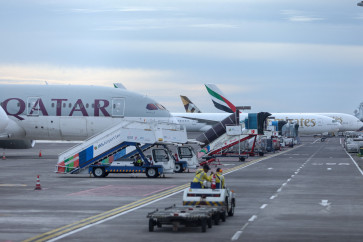Popular Reads
Top Results
Can't find what you're looking for?
View all search resultsPopular Reads
Top Results
Can't find what you're looking for?
View all search resultsInsight: Should we be worried about territorial disputes in East Asia?
East Asia is increasingly becoming a region of contradictions
Change text size
Gift Premium Articles
to Anyone
E
ast Asia is increasingly becoming a region of contradictions. On the one hand, it has become a center of global attention due to the growing significance of the region to the global economy. Speedy economic growth in the region, particularly in China and India, has fuelled talk about the coming of an Asian century.
From a strategic point of view, many have also pointed out that the center of gravity of global politics has shifted to East Asia. In short, East Asia has been described as the future center of global prosperity.
However, there is still doubt as to whether the region’s growing prosperity will be followed by regional stability. Ongoing diplomatic tensions and political spats over a number of territorial issues point to a worrying future for peace and stability in the region. Indeed, territorial disputes in East Asia have begun to emerge as a serious flash point, raising regional concerns about the future of East Asia as a whole. In other words, as peace in East Asia remains precarious; prosperity
cannot be taken for granted.
Just look at the South China Sea, where tensions have been simmering for months. Diplomatic squabbles between China and two Southeast Asian countries — Vietnam and the Philippines — on competing claims in the South China Sea have begun to affect the wider region. For the first time in 45 years, ASEAN’s Foreign Ministers Meeting (AMM) failed to issue a joint communiqué. The failure was caused by only one issue: the South China Sea.
Despite Indonesia’s efforts to restore ASEAN’s unity on the issue and a push for the early conclusion of a code of conduct on the South China Sea, a peaceful outcome of this process is still far from certain. On the contrary, as the military dimension of the dispute gradually adds complications to the problem, the prospect for managing the dispute through peaceful means might even become more difficult. Moreover, there is also an emerging strategic rivalry between China and the US at the background that might make any attempt to manage the problem even more challenging.
At the same time, bilateral territorial disputes between ASEAN countries — such as between Malaysia and Indonesia and between Thailand and Cambodia — have also created diplomatic tension among the disputing parties.
Territorial disputes are also a cause for concern in Northeast Asia. Dispute between China and Japan over the Senkaku or Diaoyu Islands has long been a problem in bilateral relations between Beijing and Tokyo. Between Japan and South Korea, the dispute over the Takeshima or Dokdo Islets has also served as an irritant in Tokyo and Seoul’s bilateral relations. However, recent diplomatic tensions between Tokyo and Beijing and between Tokyo and Seoul demonstrate how territorial disputes remain a serious problem for the region.
The problem between China and the four ASEAN claimants in the South China Sea is being addressed within the framework of the Declaration of Conduct (DoC) and ASEAN and China are also working on a Code of Conduct (CoC) that could serve as a platform for managing the problem peacefully. Japan and South Korea are both American allies, and the US could play a mediating role to ease the tension between the two. Of all East Asia’s territorial disputes, therefore, the problem between China and Japan is particularly worrying in this regard. It is not clear how both sides are going to manage the territorial dispute.
In fact, recent developments in China-Japan relations have not generated much optimism. The dispute over the Senkaku/Diaoyu Islands has once again heightened tensions between the two countries. Both sides were soon locked in a tit-for-tat game: a Hong Kong-based pro-China group — calling itself the Action Committee for Defending the Diaoyu Islands — landed on a disputed island in the area, Japan arrested and deported the group, protests with visible anti-Japanese tone took place in parts of China, a number of Japanese activists retaliated by landing on the same island, followed by complaints from China’s government.
The cycle might not stop there. The Hong Kong-based group now plans to organize more protests outside Japanese embassies and consulates around the world on Sept. 18, and has urged ethnic Chinese all over the world to join the protests. As nationalism becomes part of the dispute, further frictions between the two countries are not unlikely.
These territorial problems, if not managed properly and in a restrained manner, will seriously undermine peace, stability, and prosperity in East Asia. Parties to the disputes — both in Southeast and Northeast Asia — need to realize that the promise of Asian century is too valuable to be undermined by territorial conflicts.
The writer is executive director of the Centre for Strategic and International Studies (CSIS), Jakarta.










